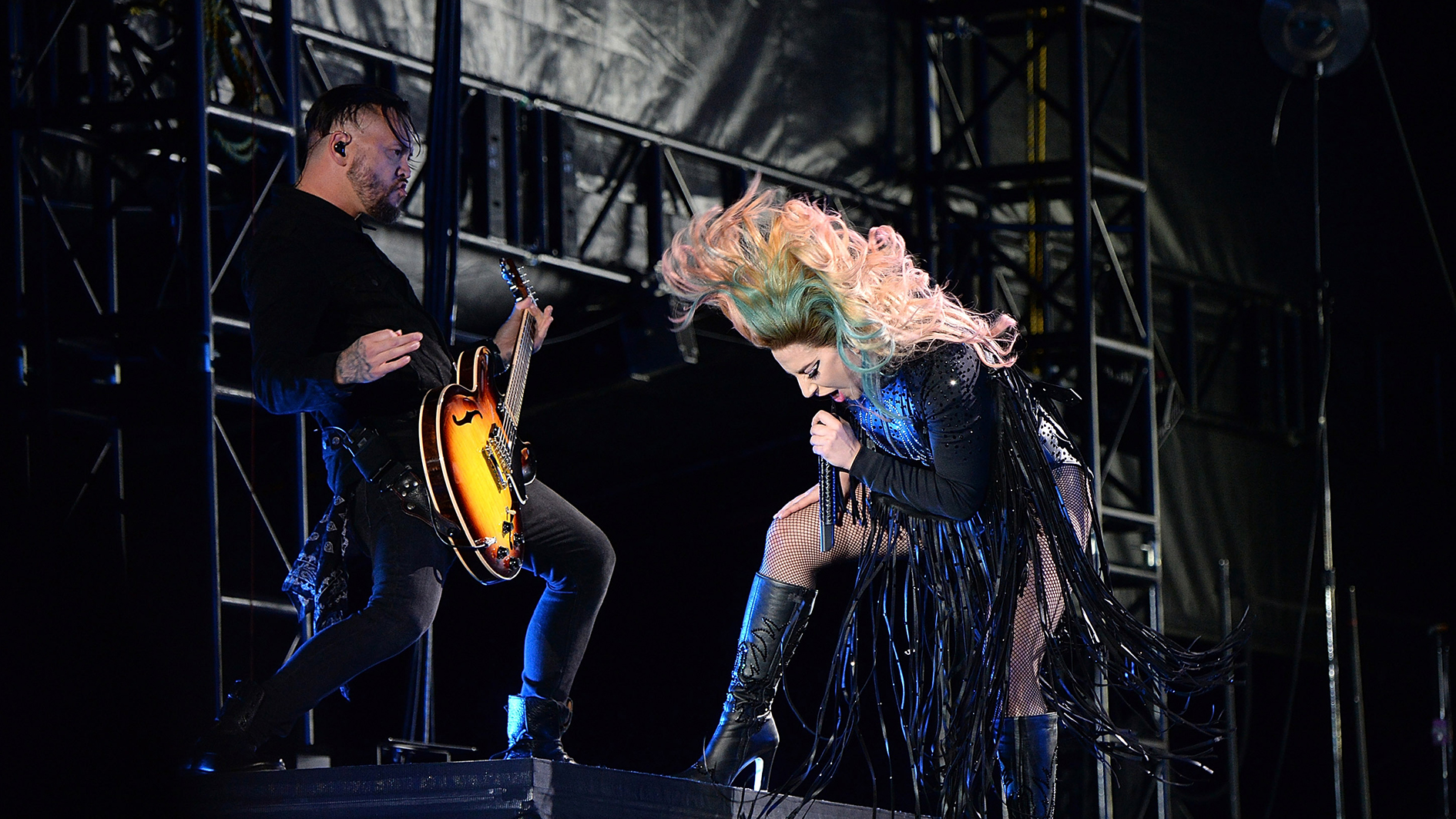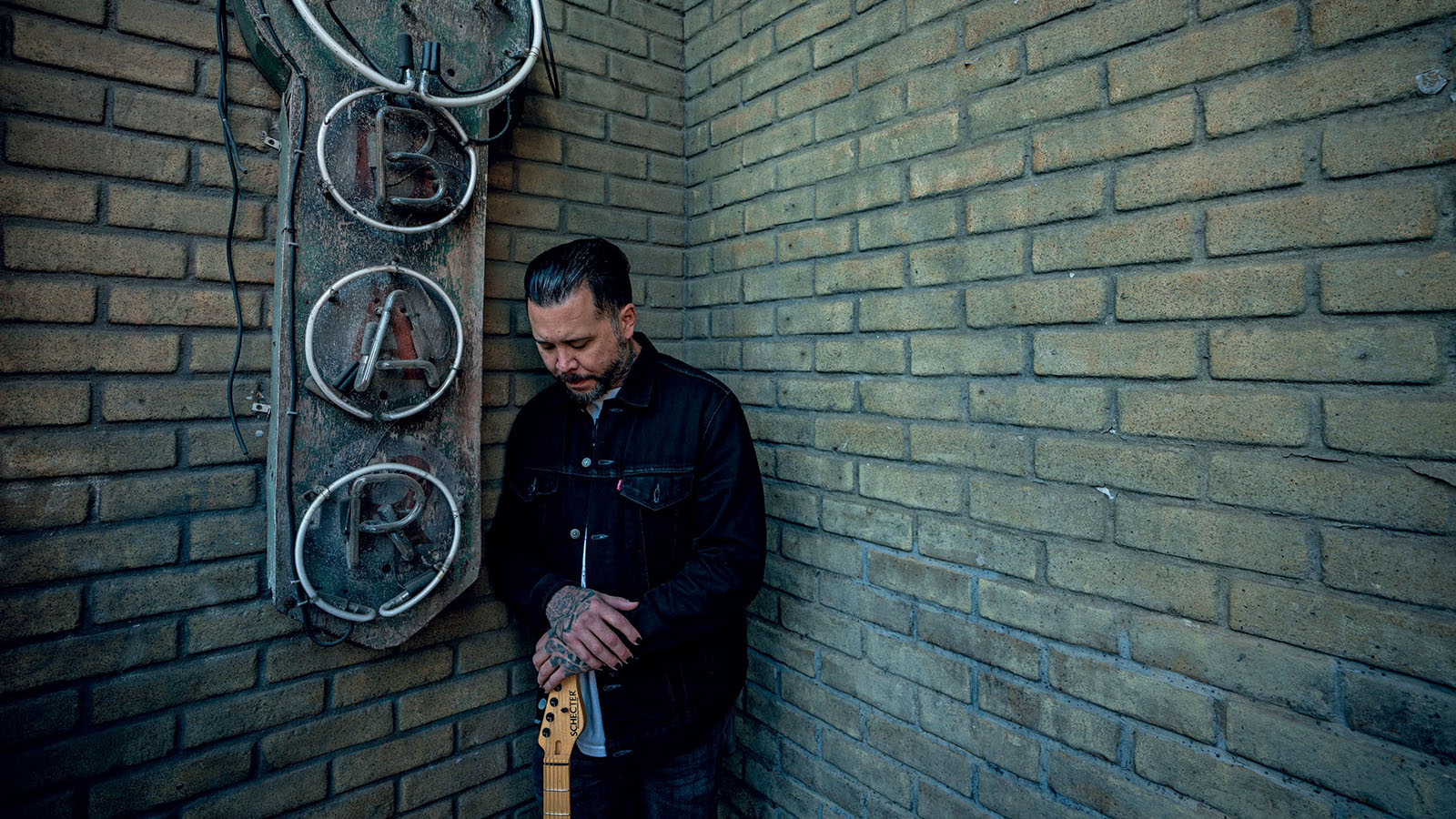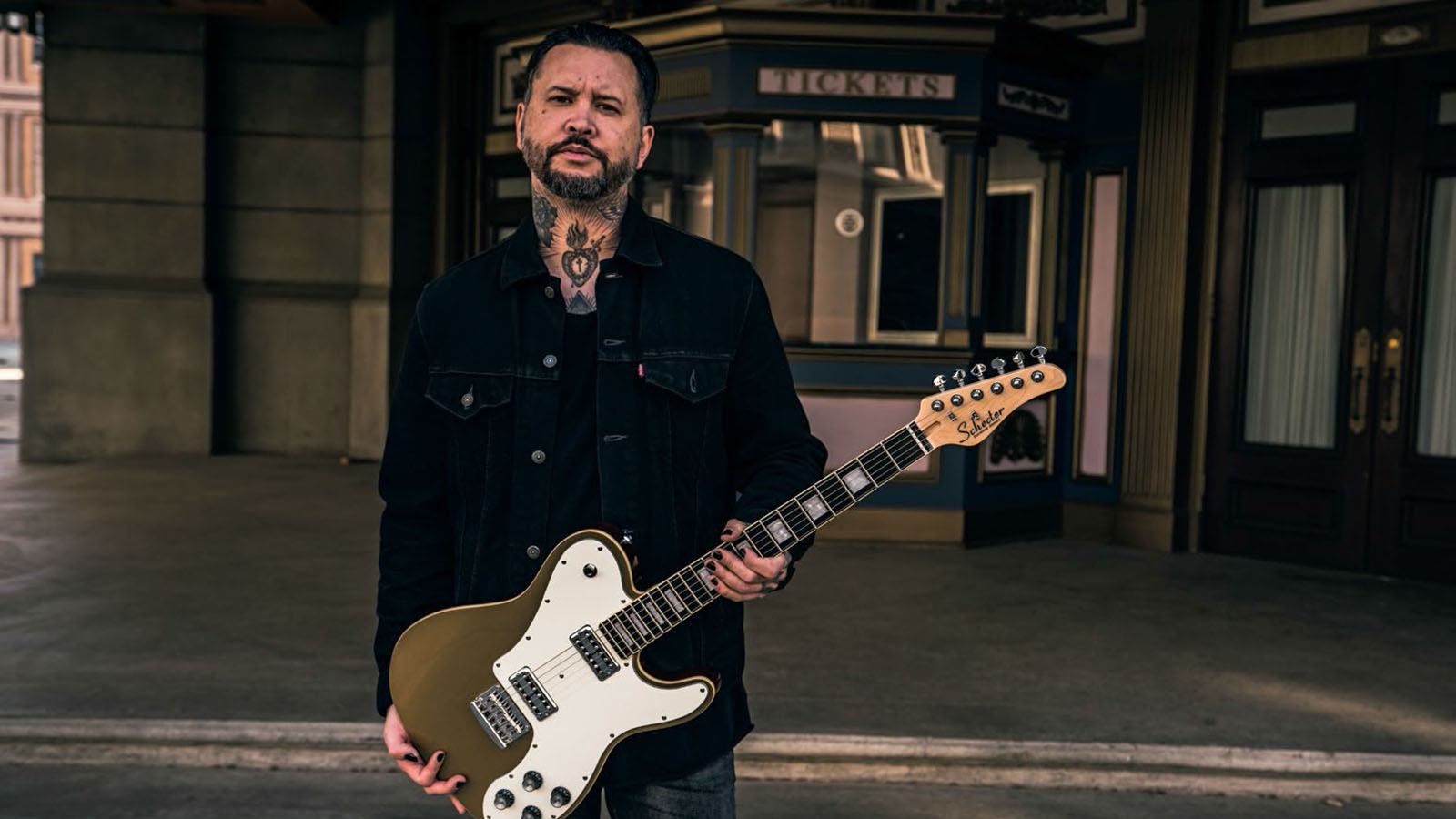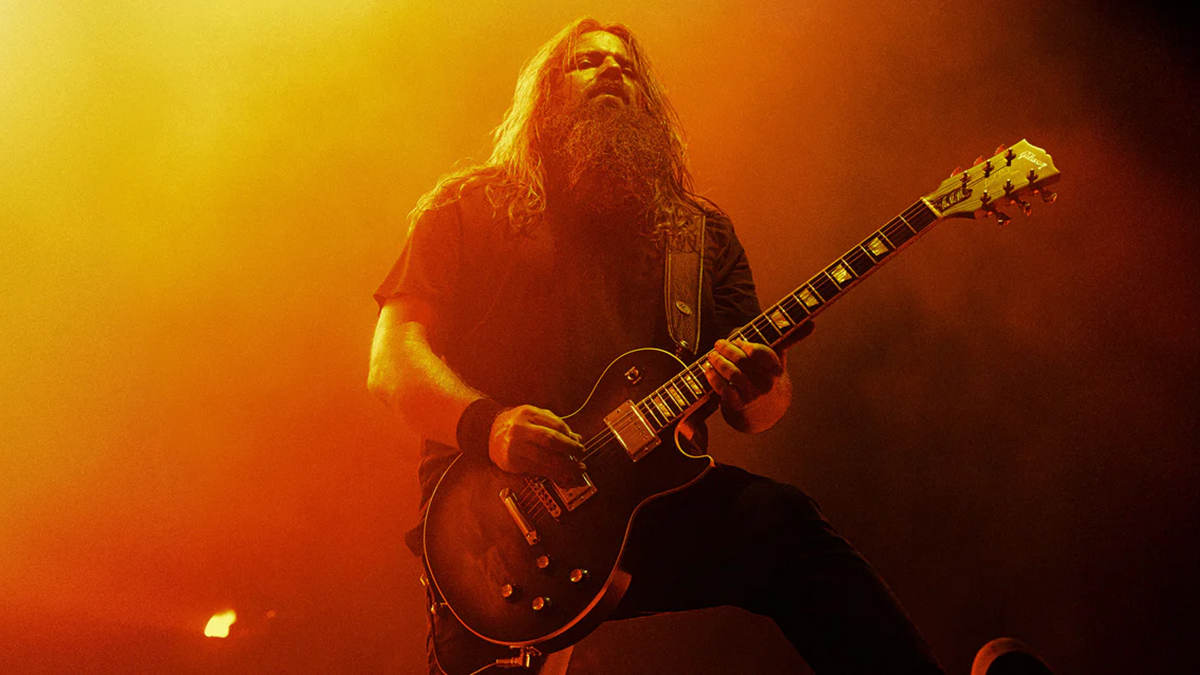Lady Gaga guitarist Tim Stewart: "We get pop fans come to see her, but we get the guys from Anthrax and Slayer, too"

All the latest guitar news, interviews, lessons, reviews, deals and more, direct to your inbox!
You are now subscribed
Your newsletter sign-up was successful
During the past two decades, Tim Stewart has established himself as the first-call guitarist for pop music’s biggest stars. Even a cursory glance at the 44-year-old Los Angeles-based axe man’s credits is nothing short of staggering: He’s toured and/or recorded with artists such as Rihanna, Jennifer Lopez, Janet Jackson, Mariah Carey, Miley Cyrus, Britney Spears, Adam Lambert - and that’s just for starters.
So what is it about Stewart - or more specifically, what is it about his guitar playing -that places him in such high demand? By his own admission, he’s not much of a showboater. Given his druthers, he’s content to lay back and play deep, in-the-pocket grooves - although when called on to bust out a solo, he’ll uncork a metallic-tinged doozy.
People hire me because I’m versatile. I can play rock, funk, R&B and pop. No matter the style of the song, I really get into the rhythm
“It’s a funny thing, because nobody’s ever come out and told me, ‘Hey, I like you because you do this,’” he says. “I think people hire me because I’m versatile. I can play rock, funk, R&B and pop. No matter the style of the song, I really get into the rhythm. To me, that’s what makes music tick. Sticking with that pocket is harder than it sounds, but once you get it, it becomes part of your mindset.”
For the past few years, Stewart has been a key fixture in Lady Gaga’s band. He recalls the experience of playing with the pop star at 2017’s Super Bowl as one of the most memorable moments of his career.
“There’s no way I can fully describe the feeling you have on that stadium stage,” he says. “You’ve got everybody around you, and you’re being beamed out to a billion people around the world. It’s thrilling, humbling, scary, crazy - you’re like, ‘This can’t possibly be happening, right? This must be a dream.’”
Since last year, Stewart has been playing with Lady Gaga at her ongoing residency shows in Las Vegas, but he stresses that this is no schmaltzy lounge gig. When the band isn’t performing one of the pop icon’s many hits, they might be prompted to segue from jazz standards to an Iron Maiden cover.
“She’s in this upper stratosphere of fame, but people have to remember she’s a serious musician,” Stewart says.
All the latest guitar news, interviews, lessons, reviews, deals and more, direct to your inbox!
“She’s really trippy and exciting in that way. There is no limit to the kinds of music she likes to play, and that’s why we get so many types of people who come to see her. We get pop fans, but we get the guys from Anthrax and Slayer, too. For a lot of the show, we do a German industrial thing, so I tune down to C and just go. For a guitar player like me, it’s so cool to be a part of that.”
That was the one piece of advice I got from everybody: Go out and play and say yes to whatever comes at you. So I played everywhere and with everybody
During breaks in Lady Gaga’s Vegas shows, Stewart has been flying back home to Los Angeles to join guitarist Greg Suran in the American Idol house band. Having studied jazz and classical guitar at Cal State University, Stewart likens his tenure on the show to something of a continuing-ed course in music. “American Idol is very fast paced, and there’s so much material I have to learn each week,” he says.
“And I have to get things right - my tone, my phrasing. There’s no room for slop. The whole band is full of top-notch players. I’ll sit with Greg and go through stuff, and at times it feels like I’m getting paid to take lessons.”
With his dance card perpetually filled, one might imagine that Stewart has little time for his own musical endeavors, but back in 2013 he and his co-guitarist in Lady Gaga’s band, Ricky Tillo, found a few minutes in their schedules and formed a hiphop/thrash group called thebandknives.
The outfit released their debut album, KNIVES, last year, and they’ve just issued a follow-up titled 11110. Beyond time constraints, geography is also a sticking point for the band: Tillo is based in Toronto, while singer Mr. J. Medeiros lives in Paris.
Playing guitar in church when I was 12 was the perfect training ground for me, because I had to learn songs and play them live
“It’s definitely a juggling act,” Stewart admits. “When we first started doing this, I thought, ‘How can we make this work?’ But we manage to come together and create, and I’m really happy with what we’re coming up with. Whether I’m doing my own thing or being a sideman, I feel very fortunate to play with such marvelous people.”
Let’s go back to the beginning. How did you start playing the guitar?
"My whole family plays music. I was raised in church, and that’s where I started playing when I was 12. We played worship-type music; it had elements of rock and R&B. It was kind of the perfect training ground for me, because I had to learn songs and play them live.
"I was always playing guitar in elementary school and high school. We started our own rock bands and played in garages. It was a combination of that - church and garage bands."
Even though you grew up with music, was there one specific artist who really blew your mind and set you on your path as a guitarist?
"Eddie Van Halen. When I heard him, that’s when the guitar kind of exploded in my head. He made me go back and listen to Jimmy Page, Jimi Hendrix, all the classics. And then I started playing all the time, six and seven hours a day.
"I didn’t always fit in at school, so I would hide out in my bedroom and play. I got so much fulfillment from that. At the same time, my sister was into the Bay Area thrash scene - Testament, Death Angel, Forbidden, all those types of bands. I got into Alex Skolnick when I was 14 or so. The guy’s incredible. I liked how he could mix up everything but he was still playing thrash. I wanted to do the same thing."

Your guitar sound at times recalls '70s disco and '80s-era Madonna. I hear bits of Nile Rodgers, but also David Williams, who used to play with Madonna and Michael Jackson.
"David Williams, man - he was awesome. I dug him and Paul Jackson Jr. Of course, I listened to Al Green’s band and Sly and the Family Stone. I loved Earth, Wind & Fire, too. Great rhythm guitar on all that stuff."
You were all over the map when you were younger - church music, R&B, thrash metal. And then you studied jazz and classical guitar in college.
"I really liked everything. That’s just the way I am, and I think it prepared me for what I eventually did. If I limited my listening and playing, I would be stuck in a rut, or I’d be pigeonholed - “He only does one thing.”
I’m still in awe of what Marty Friedman, Steve Vai and Joe Satriani can do
Were you always into Strats and Strat-style guitars?
"I love Strats, but my main thing was Teles. Give me a Tele and it feels like home, although I do love humbucker guitars like SGs and Les Pauls. It depends on the music you’re playing; you pick up the right guitar for the sound you want. I’m all over the place with the guitars I play."
You were inspired by Eddie Van Halen, but did you ever get into the really technical shredder stuff?
"Oh, sure. I got into the Shrapnel guys - Marty Friedman, Jason Becker, Gregg Howe. And, of course, I loved Joe Satriani and Steve Vai. There was a time I was into the super-heavy stuff. I still listen to it from time to time, and I’m still in awe of what those guys can do."
Can you tell us a little about how you got your big break? How did you secure your first pro gig?
"My first pro gig was with Jessica Simpson in 2001. I had just moved to L.A. and joined a band called 4th Avenue Jones. We had a deal with Interscope, but it just wasn’t moving as fast as we wanted. That’s when I got a call for the Jessica Simpson gig. I met her musical director and we hit it off. That was the first thing that got things clicking for me."
A photo posted by @timstewart on Feb 2, 2020 at 3:08pm PST
Were you ambivalent about leaving your main band at first to take a session job with a pop artist?
"Initially, I was. You know, I wanted to be in my own band and do my own thing, but at the same time, I was newly married and I needed to work. It was strange at first. I was a little naive, like, 'I don’t know this person’s music. It’s not really aimed at me.'
"But once I got in the band, I started to realize, 'Hey, this can be OK.' And I met so many cool people and amazing musicians. I’m so thankful that I got the chance and that I didn’t say no. Playing with Jessica really put me on my way to supporting a lot of huge artists."
How did you build on things after Jessica Simpson? Did people start calling you?
When I’m on the road, I take a mobile situation - my laptop, an interface and amp modeling - and I can do what I need anywhere. It’s pretty incredible
"They did, and I just said yes to everything. That was the one piece of advice I got from everybody: Go out and play and say yes to whatever comes at you. So I played everywhere and with everybody.
"I worked with different producers, and then I’d go off to jam sessions. And I still played at churches around LA. A lot of the sidemen were playing in churches, so for me, playing with them was a good way to network."
Back in the day, there was the Wrecking Crew, and after them came the Laurel Canyon session players. Does anything like that exist now in L.A.?
"It exists in some way, but it’s not like those situations. There’s a whole new group of people making records that aren’t really dependent on live musicians as much. They don’t have to schedule sessions; records are made in people’s homes, and there’s no set schedule.
"Right now, I’d say 80 percent of what I do is remote recording, and that’s fine. I have my own space that I record in. When I’m on the road, I take a mobile situation - my laptop, an interface and amp modeling - and I can do what I need anywhere. It’s pretty incredible."
How do you prepare for an audition? What’s expected of you when you walk into a room?
A photo posted by @timstewart on Mar 22, 2019 at 7:09pm PDT
"They generally give me a couple songs to learn, so I make sure I know them. I come in prepared, and I have my sounds all dialed in. Things move pretty fast, so you don’t want to waste anybody’s time.
"That’s the biggest thing: show people that you’re reliable and that you can do the gig. As far as how you need to act, it really depends on who you’re auditioning for. Not everything works for everybody. If you have to be a bit of a showman, then be a showman. If they want you to lay back, then do that. You have to know what the specific gig is calling for."
Is the artist at the audition, or is it usually the musical director?
"Usually it’s the musical director. Sometimes the artist is there, but generally not. The artist hires the musical director to pick the musicians. That’s the person you need to impress and build a relationship with."
You touched on this. How important is a player’s personality during an audition?
"Personality is huge, man. You can’t be a jerk. If you have an attitude or a superiority complex, you’re not going to last. You have to remember, it’s two hours on stage, but it’s 22 hours when you’re hanging with the band. You need to make sure you’re a decent person for the road. For me, that comes pretty easily. Bands become family out on the road, and I like that kind of thing."

Does playing live pay better?
"It all depends on who you’re playing for and what kinds of sessions they are. Some recording sessions pay well, but other times the budgets can be a little tight. With touring, yeah, if you’re out on the road for a while the pay is more consistent. It’s really a case-by-case thing."
Let’s talk about the tools of your trade. What guitars and gear do you generally rely on?
For most situations, I bring a couple of humbucker-type guitars - a 335 and my ’79 Les Paul. Then I’ll bring a Tele, a Strat and a Nash, and I’ve got some Schecters that I really like.
"I have a custom Schecter that’s based on the Dan Donegan Ultra, and I love that one. For amps, I like Kempers. For the Gaga stuff and the last Rihanna tour, it’s been Kemper's Profiler Power Racks - I put ’em through cabs.
"I’m pretty basic with effects. I like the Eventide H9 for modulation, chorus and reverb. For delay, the Walrus ARP-87 is great. Vertex makes awesome overdrive pedals. I also use the KHDK Ghoul Screamer for overdrive, and I like their Scuzz Box quite a bit. EarthQuaker and Beetronics make some really nice pedals, too."
For younger guitarists hoping to be the next Tim Stewart, what kind of advice can you offer?
"Pretty much what I said about myself: Go out there and play, and say yes to everything. Build friendships and be cool. Do whatever you’ve got to do to stay inspired and learn.
"I know that sounds pretty general, but it’s what worked for me. If you play everywhere and get to know people, the right doors will open. It’s just a matter of time."
Tim's tips: how to get a gig
A photo posted by @timstewart on Feb 16, 2019 at 9:14am PST
- Show people that you’re reliable and that you can do the gig.
- Personality is huge, man. You can’t be a jerk. If you have an attitude or a superiority complex, you’re not going to last.
- Things move pretty fast, so you don’t ever want to be wasting anybody’s time.
- The artist hires the musical director to pick the musicians. That’s the person you need to impress and build a relationship with.
- Go out there and play, and say yes to everything. Build friendships and be cool. If you play everywhere and get to know people, the right doors will open. It’s just a matter of time.
Joe is a freelance journalist who has, over the past few decades, interviewed hundreds of guitarists for Guitar World, Guitar Player, MusicRadar and Classic Rock. He is also a former editor of Guitar World, contributing writer for Guitar Aficionado and VP of A&R for Island Records. He’s an enthusiastic guitarist, but he’s nowhere near the likes of the people he interviews. Surprisingly, his skills are more suited to the drums. If you need a drummer for your Beatles tribute band, look him up.



